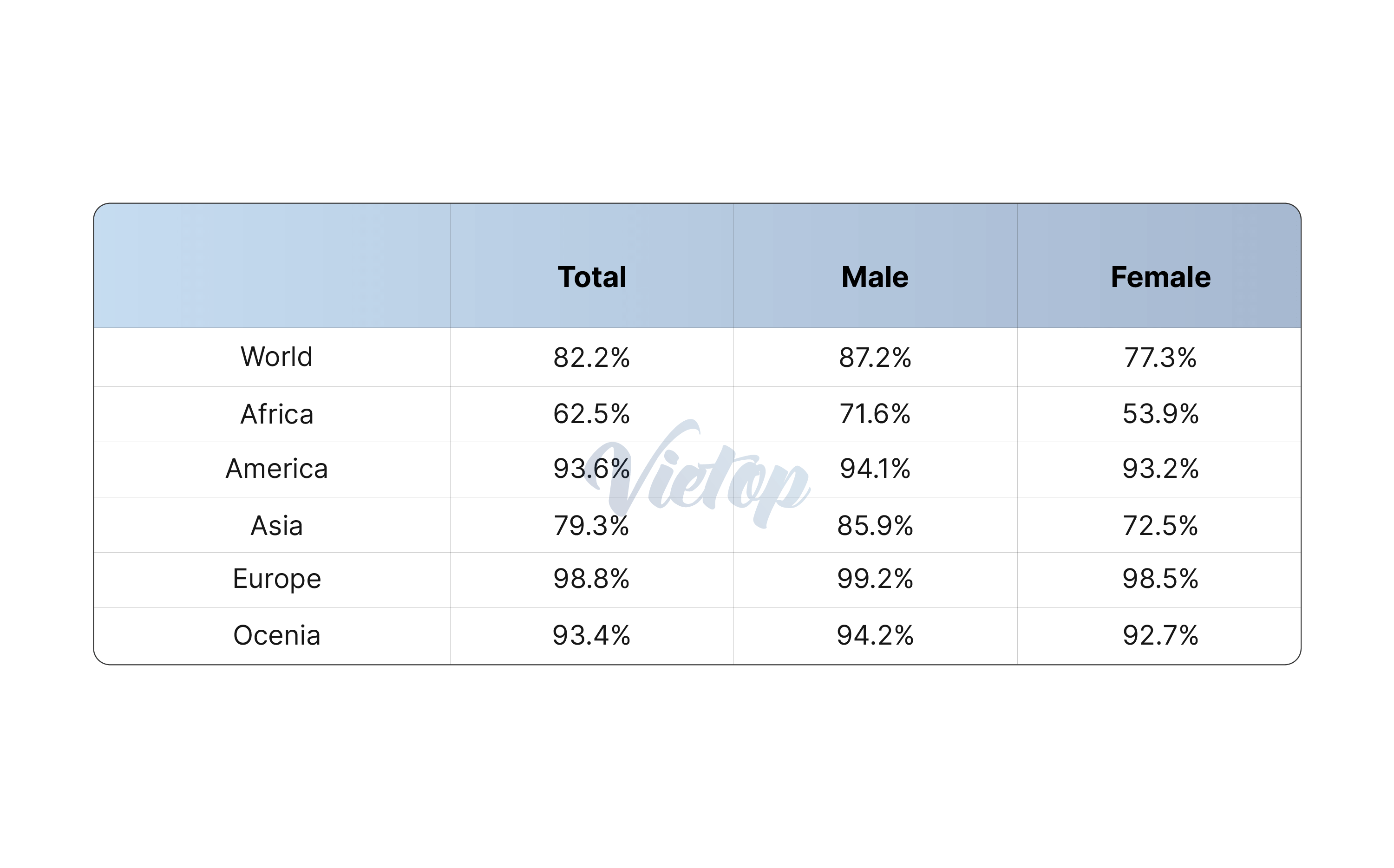Topic Gender – IELTS Writing samples có thể được xem là tương đối khó nhằn đối với phần lớn học viên do chúng ta thật sự không có quá nhiều kiến thức cũng như lượng từ vựng tương thích với chủ đề này. Nội dung bài viết này, IELTS Vietop sẽ giới thiệu một số từ vựng liên quan và bài viết mẫu để tham khảo về chủ đề Gender – IELTS Writing samples này nhé.
IELTS Writing task 1
TASK 1: The table below shows the estimated literacy rates by region and gender for 2000-2004. Summarise the information by selecting and reporting the main features, and make comparisons where relevant.

Sample
The given table illustrates the proportion of literate people of both genders in different parts of the world from 2000 to 2004. Overall, there was the widest discrepancy in the literacy rates of Europe and Africa. It is clear that males had higher literacy rates compared to females.
In terms of the total population, the population who were able to read and write mostly concentrated in Europe, with its figure amounting to 98.8%. Similar figures were recorded for people who were able to read and write in Oceania and Americas, both standing at over 93%. Literate individuals in the world took up 82.2%, which was approximately 10% and 20% higher than the figures for Asia and Africa respectively.
When it comes to males, Europe was also the area in which there was the largest proportion of literate people (99.2%). The percentage of literate males in Oceania and Americas were similar, with their figure amounting to little above 94%. More men were able to have reading and writing skills in the World than in Asia, with 87.2% for the former and 85.9% for the latter.
Literate men in Africa took up 71.6%, ranking last among the given regions. A similar picture is evident in the literacy rate of women, with the highest rate recorded in Europe. Like their male counterparts, there was a negligible gap in the number of literate people in Oceania and Americas. While the statistics for Asia and the World were all over 70%, Africa was considered the area which had the lowest number of literate women, with its figure being 53.9%.
Vocabulary
- literate: có khả năng đọc và viết
- concentrate: tập trung
- the widest discrepancy: khoảng cách lớn nhất
Phân tích
Nhìn chung, dân số có khả năng đọc và viết ở Europe và Africa có khoảng cách lớn nhất. Thêm vào đó, số lượng người nam biết chữ cao hơn nữ ở tất cả các khu vực.
Ở bài viết này, chúng ta chỉ cần đi so sánh các số liệu của các khu vực ở mỗi hạng mục. Điều đặc biệt đó chính là số liệu của Nam có những sự tương đồng so với số liệu của Nữ.
Xem thêm:
Topic Health – IELTS Writing sample

Nhận tư vấn miễn phí khóa học hè
IELTS Writing task 2
TASK 2: In many schools and universities today, women have a tendency to study the humanities (such as the arts and languages) while men more often major in science related subjects. Some believe this tendency should be changed.
To what extent do you agree or disagree?
Sample
In most academic settings, there are more females opting for courses appertaining to humanities, particularly arts and languages while their male counterparts choose science disciplines. However, to some people, this gender stereotyping should be challenged. In my opinion, while this point of view is valid to a certain extent, I am more of the opinion that individuals should be at liberty to choose their major as being compelled to choose unwanted subjects can lead to a lack of motivation to pursue them
It is understandable why the gender bias of preference on subjects should be eliminated. Due to the cultural transmission of gender stereotypes, the majority of parents and teachers often acknowledge that humanities often involve soft subjects that appeal to the emotionality of women while scientific subjects which require more logical thinking and physical experiments are considered to suit men’s ability.
This is also the case in some institutions where male teachers are more likely to specialize in STEM (science, technology, engineering and math) whereas their female co-workers are more likely to teach humanities and languages. As a result, gender-stereotyped expectations and a lack of educational role models may discourage women from pursuing scientific subjects and men from opting for humanity-related subjects even though they have potential to excel in those fields. This may result in gender inequality in the workforce and some potential job applicants might be overlooked.
However, I contend that enforcing changes to cultural gendering in subject choice holds little value as individuals should have freedom of choice to choose their subjects. Not being entitled to make decisions on their own can cause resentment and negative attitudes among students, which can lead to their lower level of academic performance. Additionally, academic qualifications should not be judged based on one’s gender.
The Empathizing-Systemizing theory, in fact, has concluded that it would be wrong to judge a student based on his or her gender both morally and scientifically. The assessment on the prospect of students has to be made on their academic performance and sets of skills that they have mastered. This is a powerful testament to the fact that people should be encouraged to select their preferable disciplines so that they are driven to reach their full potential and more likely to succeed in their future career.
In conclusion, although the eradication of gender stereotyping on choosing subjects is reasonable to some extent, my firm conviction is that this practice is not necessary as everyone should be given freedom to study subjects at school based on their interests.
Vocabulary
- Be at liberty to do something: đươc tự do làm điều gì đó
- Gender stereotype: khuôn mẫu giới
- Enforce changes to something: tiến hành những sự thay đồ cho cái gì đó
- Cultural gendering : Viêc phân hoá giới thính theo văn hoá
- Prospect: triển vọng
- Driven to reach their full potential: có động lực để trở nên hoàn thiện nhất
Phân tích
Ở bài viết này người viết sẽ phân tích sự đồng ý một phần một phần với quan điểm đề bài cho. Tuy nhiên, tác giả sẽ thể hiện sự đồng tình mạnh mẽ hơn với quan điểm “Mọit người nên có sự tự do để chọn môn học mà mình thích”
Body 1: Định kiến về giới tính khi chọn môn học nên được thay đổi.
Vì sự lưu truyền văn hoá về khuôn mẫu giới, đa số ba mẹ cũng như thầy cô nghĩ rằnng những môn học nhân văn sẽ phù hợp hơn với tính đa cảm của phụ nữ trong khi những môn về khoa học mà bao gồm tư duy logic và thí nghiệm thực tiễn sẽ phù hợp hơn với nam.
Điều đó có thể thấy ở một số cơ sở dạy học nơi mà giáo viên nam sẽ thiên về dạy các môn khoc học trong khi nữ giới sẽ chọn dạy các môn nhân văn và ngôn ngữ. Điều đó vô hình chung đã khiến các bạn học sinh dám chọn đúng ngành sở trường của mình. Điều này sẽ dẫn đến sự mất cân bằng về giới tính và một số ứng viên tiềm năng có thể bị bỏ qua.
Body 2: Sự thay đổi về định kiến về giới tính không nhất thiết phải diễn ra
Việc không được chọn đúng ngành sẽ tạo ra những tam lý tiêu cực và sự khó chịu đối với học sinh -> Năng suất học tập sẽ kém đi. Hơn nữa, việc đánh giá khả năng của một người không thể dựa vào giới tính của họ. Việc đánh giá đó dựa trên kết quả học tập cũng như các kĩ năng mà họ có được -> Việc chọn được một học yêu thích sẽ giúp học phát triển tốt nhất tiềm năng của họ và thành công hơn trong tương lai.
Xem ngay: Tổng hợp đề thi IELTS Writing 2023 kèm bài mẫu chi tiết
Thông qua bài viết chắc hẳn các bạn đã có cho mình thêm những kinh nghiệm và cách hoàn thiện Topic Gender – IELTS Writing samples. Nếu các bạn có thắc mắc hoặc có những đề tài thú vị khác thì có liên hệ với Vietop nhé, IELTS Vietop sẽ luôn cố gắng dễ hỗ trợ bạn tốt nhất.
Xem ngay: Khóa học IELTS Cấp Tốc – Cam kết tăng ít nhất 0.5 – 1.0 band score SAU 1 THÁNG HỌC

![[ACE THE TEST] Giải đề IELTS Writing ngày 20/07/2024 3 [ACE THE TEST] Giải đề IELTS Writing ngày 20/07/2024](https://www.ieltsvietop.vn/wp-content/uploads/2024/07/giai-de-ielts-writing-ngay-20-07-2024.jpg)
![[ACE THE TEST] Giải đề IELTS Writing ngày 11/07/2024 4 giai de ielts writing ngay 11 07 2024](https://www.ieltsvietop.vn/wp-content/uploads/2024/07/giai-de-ielts-writing-ngay-11-07-2024.jpg)
![[ACE THE TEST] Giải đề IELTS Writing ngày 06/07/2024 5 giai de ielts writing ngay 06 07 2024](https://www.ieltsvietop.vn/wp-content/uploads/2024/07/giai-de-ielts-writing-ngay-06-07-2024.jpg)
![[ACE THE TEST] Giải đề IELTS Writing ngày 22/06/2024 6 [ACE THE TEST] Giải đề IELTS Writing ngày 22/06/2024](https://www.ieltsvietop.vn/wp-content/uploads/2024/06/giai-de-ielts-writing-ngay-22-06-2024.jpg)
![[ACE THE TEST] Giải đề IELTS Writing ngày 15/06/2024 7 [ACE THE TEST] Giải đề IELTS Writing ngày 15/06/2024](https://www.ieltsvietop.vn/wp-content/uploads/2024/06/giai-de-ielts-writing-ngay-15-06-2024.jpg)
![[ACE THE TEST] Giải đề IELTS Writing ngày 08/06/2024 8 [ACE THE TEST] Giải đề IELTS Writing ngày 08/06/2024](https://www.ieltsvietop.vn/wp-content/uploads/2024/06/giai-de-ielts-writing-ngay-08-06-2024.jpg)
![[ACE THE TEST] Giải đề IELTS Writing ngày 01/06/2024 9 [ACE THE TEST] Giải đề IELTS Writing ngày 01/06/2024](https://www.ieltsvietop.vn/wp-content/uploads/2024/06/giai-de-ielts-writing-ngay-01-06-2024.jpg)
![[ACE THE TEST] Giải đề IELTS Writing ngày 25/05/2024 10 [ACE THE TEST] Giải đề IELTS Writing ngày 25/05/2024](https://www.ieltsvietop.vn/wp-content/uploads/2024/05/giai-de-ielts-writing-ngay-25-05-2024.jpg)


